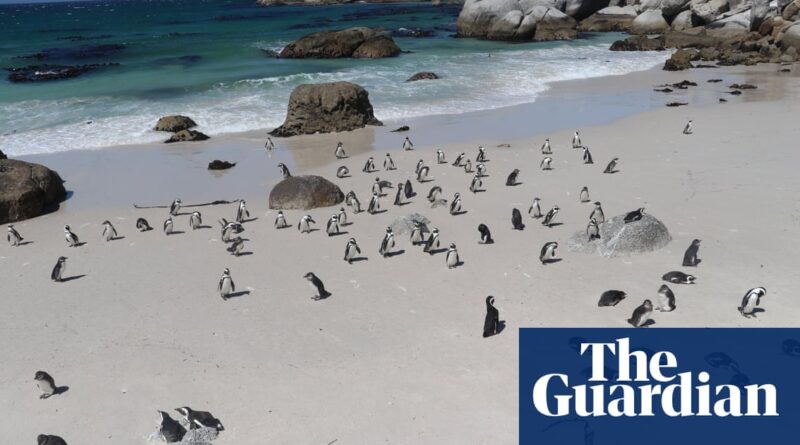Minister calls for legal solution for South Africa’s endangered penguins
South Africa’s new environment minister has said she wants to stop African penguins from becoming extinct by taking steps that include settling a lawsuit brought by two environmental charities to stop fish in the great bird habitats.
BirdLife South Africa and the Southern African Foundation for the Conservation of Coastal Birds (SANCOB) say they are calling for the extension of no-fishing areas around the six coasts and islands where the penguins breed, after ‘a failure to reach an agreement with the fishing industry groups sought by the previous employee.
African penguins face the threat of extinction by 2035 if their population continues to decline at the current rate of 7.9% per year. A hundred years ago, there were about 1 million groups. Now there are less than 10,000.
Dion George, who became environment minister in early July as part of the new coalition government, said: “My goal is to make sure the penguins don’t go extinct and I think someone else and another one with that goal in mind.
“I don’t see the benefit of penguins of lawyers fighting in court, maybe for [a] long [time],” he said.
Conservationists and fishing industry groups have been fighting out of court for years. Among the things they disagree on is the extent to which catches of sardines and anchovies, which the penguins eat, have declined, and how much the expanding no-fishing zones can stem that decline. .
Successive governments have failed to make the two sides reach a compromise between the loss of the fishing industry and those whose livelihoods depend on it, and the protection of penguins. And, without an agreement, they are unwilling to implement the strong conservation measures that environmentalists say are necessary.
Alistair McInnes, who leads South Africa’s seabird conservation work, BirdLife, said: “When these populations are in this kind of vulnerability, and they start to decline, they are actually more affected by the consequences. other random ones.”
“If, for example, you have an epidemic or [oil spill] in the sea, a disproportionate part of that colony will be affected,” he said. “So the sooner we can get this protection, the better chance the penguins can maintain their current population size. [have a] buffer [against] other random events. ”
An “island closure trial” was launched by the government in 2008 to try to resolve the dispute. The seas around the four islands were closed to sardine and anchovy fishing for three years.
But, after more than 50 hours of meetings between the two opposing groups of scientists about the data, there was still no agreement. At the end of 2022, Barbara Creecy, the environment minister at the time, appointed a group of international experts in order to end the obstacle.
Their report, published in July 2023, said that restricting fishing around breeding colonies would benefit penguin conservation, but the benefits were “small”. Fishing limits alone would not prevent the penguin population from continuing to decline, it concluded.
Creecy said he would impose fishing restrictions around the colonies, but only if conservationists and the fishing industry agreed. Since then, there have been partial bans, which the two charities said “make no sense in nature”. This prompted them to launch their own court case, which named Creecy, two of his colleagues and two fishing industry groups as defendants. The case says the minister is legally mandated to implement broad restrictions.
“Contrary to the claims of environmental NGOs in the media that the main driver is the purse-seine fishing industry, the impact of fishing. [on penguin numbers] is small,” one of the respondents, the South African Pelagic Fisheries Industry Association, told the Guardian earlier this year.
“As an industry, we have a responsibility to take all appropriate measures to protect the penguin population,” it said in an email, adding that it was committed to “an amicable resolution of the matter”.
McInnes said the “minor” impact of the fishing closures is still important to take into account other factors affecting penguin populations, from boat noise to predators and disaster. of weather. SAPFIA said earlier that the NGOs had delayed “the process tasked to determine the main drivers of the decline in penguin numbers”, which the NGO’s lawyer said refused.
George said he had no opinion on the science or policy of the matter, but he has called for a meeting with the fishing industry and environmental groups next week. “Lines are drawn and [there are] vested interests,” he said. “But where does that leave the penguins?”
#Minister #calls #legal #solution #South #Africas #endangered #penguins
